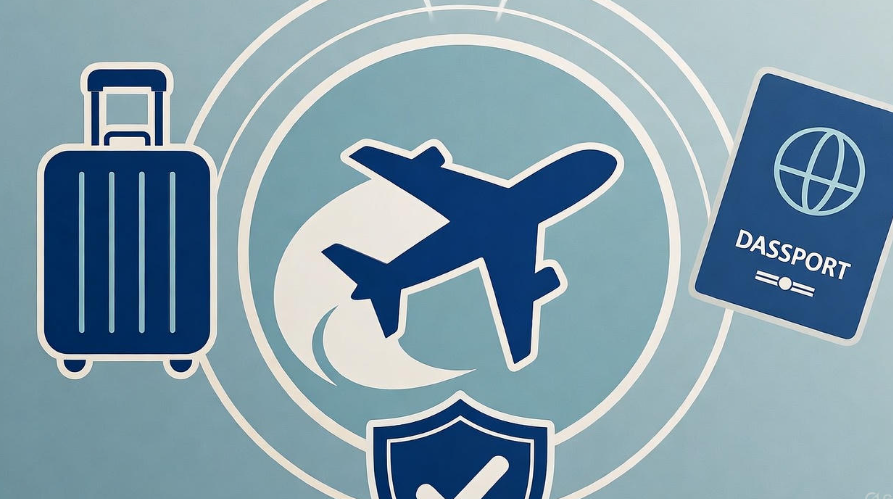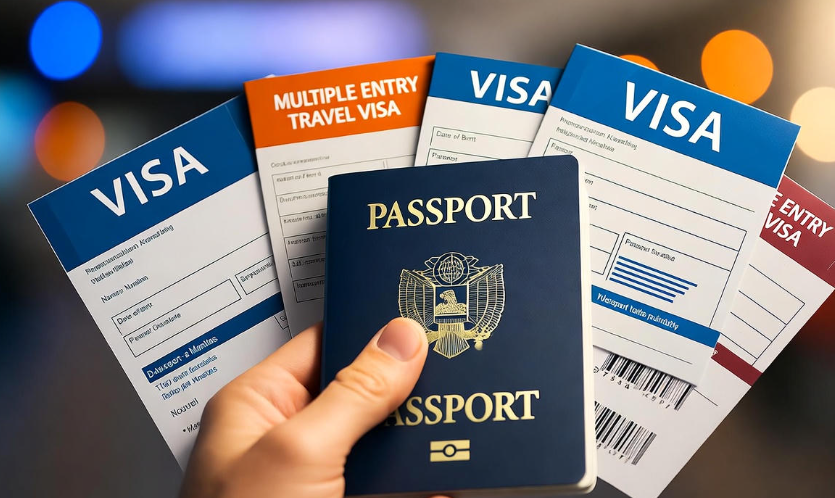If you’re applying for a visa soon, you’ve probably noticed one requirement that almost every country asks for — travel insurance. It’s not just a small detail. For many embassies, having valid travel insurance can actually decide whether your visa gets approved or delayed .
But what exactly is travel insurance? Why do you need it for a visa? And how can you book it safely and smartly without wasting money or time?
Let’s go step-by-step through everything you need to know — explained in simple English, with real-world examples, pro tips, and a few emojis along the way.
What travel insurance actually means
In simple words, travel insurance is a financial protection plan that helps you in case of unexpected events during your trip — like medical emergencies, flight cancellations, lost luggage, or even accidents.
Think of it like a safety net ️. You hope you never need to use it, but it’s there in case something goes wrong.
Most embassies ask for it because they don’t want travelers becoming a financial burden if they fall sick or face emergencies abroad.
Why embassies ask for travel insurance before approving your visa
Many people don’t realize how important this is. Travel insurance is not just a formality — it’s part of visa compliance.
Here’s why embassies care about it
| Reason | Explanation |
|---|---|
| Medical coverage abroad | It ensures you can pay for hospital or emergency care while traveling. |
| Repatriation protection | If a traveler faces death or serious injury, insurance covers the cost to return them home. |
| Embassy safety assurance | It shows that you’re financially prepared and responsible. |
| Avoiding illegal stays | Some embassies believe people without insurance might stay illegally to avoid hospital costs. |
So, if your travel insurance doesn’t match embassy standards, your visa application might get rejected — even if everything else is perfect .
How to find the right travel insurance for visa purposes
When you start searching online, you’ll find hundreds of travel insurance companies promising “visa-compliant coverage.” But not all are equal. Some might give you cheap rates but not meet your embassy’s minimum requirements.
Here’s how to choose correctly
-
Check your visa country’s rules first
Every country has its own travel insurance standards. For example:-
Schengen visa countries (like France, Germany, Italy) require minimum €30,000 medical coverage.
-
Canada recommends at least $100,000 CAD coverage.
-
UK and USA don’t specify a limit, but they prefer strong coverage for medical and emergencies.
-
-
Pick a reputable company
Always go with a registered insurance provider that has international recognition. Popular options include:-
Allianz
-
AXA
-
IMG
-
Trawick International
-
World Nomads
-
Europ Assistance
-
-
Compare multiple quotes online
Don’t buy the first plan you see. Use comparison tools like:-
InsureMyTrip
-
Policybazaar (for Asian travelers)
-
Squaremouth
These help you compare price, duration, and embassy compliance in one place .
-
-
Read the policy carefully
Make sure it includes:-
Medical expenses coverage
-
Emergency evacuation/repatriation
-
Trip cancellation/interruption
-
Lost luggage
-
COVID-19 coverage (if required)
-
Steps to book travel insurance for your visa
Let’s break this into simple, human steps so you don’t miss anything.
Step 1: Check visa requirements
Before buying anything, go to your embassy’s official website and find their travel insurance conditions. Note down the exact amount and coverage type.
Step 2: Choose your insurer
Pick a trusted company that covers your destination and duration. Look for “Visa compliant plans” — most companies label them clearly.
Step 3: Enter your trip details
When booking, you’ll be asked for:
-
Destination country
-
Travel start and end dates
-
Traveler’s age
-
Purpose (tourism, study, work, etc.)
Step 4: Select coverage amount
If you’re unsure, always choose a bit higher than the minimum. For example, if Schengen asks €30,000, choose €50,000 for extra peace of mind.
Step 5: Add optional cover
You can include add-ons like adventure sports, medical evacuation, or baggage delay — especially useful for long trips.
Step 6: Pay and download certificate
Once paid, you’ll instantly receive an insurance certificate via email. This is the document you’ll attach to your visa application file.
Step 7: Verify embassy acceptance
Check if your insurance certificate mentions:
-
The insurance company’s official seal or logo
-
Coverage limit
-
Dates matching your visa duration
-
Traveler’s full name
Pro Tip :
Always print two copies of your insurance certificate — one for the visa center and one for your own travel folder. Some embassies ask for originals during biometrics.
Common mistakes people make when booking travel insurance
Even smart travelers slip up sometimes. Here are the most common mistakes — and how to avoid them:
| Mistake | Why It’s a Problem | How to Fix It |
|---|---|---|
| Buying after applying for visa | Visa officers may reject the file if insurance dates don’t match | Buy insurance before submission |
| Picking cheap, low coverage | Fails embassy’s minimum requirement | Always verify coverage limit |
| Buying from unknown website | May not be recognized by embassy | Choose reputed companies |
| Forgetting to include all travelers | Can cause incomplete documentation | Include every traveler’s name |
| Wrong travel dates | May void your claim or delay approval | Match dates with your visa form |
| Ignoring COVID-19 coverage | Some embassies still require it | Check latest embassy updates |
How much does travel insurance cost for visa approval?
Costs vary depending on your country, age, and trip length. Here’s a general idea:
| Destination | Average Cost (per person) | Minimum Required Coverage |
|---|---|---|
| Schengen Area | $20 – $60 | €30,000 |
| UK | $25 – $70 | No fixed rule, but strong coverage preferred |
| USA | $40 – $100 | $50,000 – $100,000 recommended |
| Canada | $30 – $80 | $100,000 CAD recommended |
| Australia | $25 – $65 | Must include medical + repatriation |
Tip: Short-term visas (under 30 days) are cheaper. But if you’re applying for a long-stay visa, your insurance should cover the entire visa duration (even 6 months or more).
Should you buy local or international travel insurance?
That’s a great question. Some people think local companies are cheaper, but embassies usually prefer internationally recognized providers.
Local insurance
✅ Cheaper
❌ Sometimes not accepted by all embassies
International insurance
✅ Universally accepted
✅ 24/7 global support
❌ Slightly higher cost
If your budget allows, international insurance is always a safer choice for visa success .

How to confirm if your insurance is embassy-approved
Before you submit your visa file, take a few minutes to double-check these points:
✔ The insurance policy mentions your full name exactly as in your passport
✔ Coverage amount meets embassy requirement
✔ The policy clearly states “Valid for Schengen / UK / USA etc.”
✔ It includes medical + repatriation coverage
✔ Dates match your travel or visa period
You can also call the insurance company and ask for a “visa letter” — a short document that confirms your policy meets all embassy rules. Many providers give it for free upon request.
Can you cancel or refund your insurance if your visa is refused?
Yes — most companies allow this
If your visa gets rejected, simply send the refusal letter to your insurer within 7–14 days, and they’ll issue a full or partial refund (depending on their policy).
Always check the refund policy before buying — it should clearly mention visa refusal refund eligibility.
Travel insurance vs. health insurance — they’re not the same!
A lot of applicants confuse travel insurance with health insurance. But they’re quite different:
| Feature | Travel Insurance | Health Insurance |
|---|---|---|
| Coverage Duration | Temporary (for trip duration) | Long-term (yearly or more) |
| Main Purpose | Covers emergencies while abroad | Covers regular medical care |
| Embassy Requirement | Yes, required for visa | Not required |
| Refundable if visa denied | Often yes | Usually no |
So if your embassy asks for travel insurance, don’t try to use your home health insurance — it won’t count .
Extra benefits of booking travel insurance early
Booking travel insurance isn’t just about visa approval — it actually helps you travel with more peace of mind ♂️.
Here are some hidden benefits:
-
You can get compensation if your flight gets canceled or delayed.
-
Lost baggage? You’ll get reimbursement for essentials.
-
Sudden illness abroad? Hospital bills are covered.
-
You can cancel your trip and still get most of your money back.
It’s not an expense — it’s a smart investment in your safety and confidence abroad .
Quick checklist before you apply for visa
| Task | Status |
|---|---|
| Check embassy insurance rules | ☐ |
| Choose reputable provider | ☐ |
| Match coverage limit | ☐ |
| Confirm travel dates | ☐ |
| Add COVID-19 cover | ☐ |
| Get policy certificate | ☐ |
| Attach to visa file | ☐ |
Tick all of these boxes ✅ and your travel insurance will never cause a visa delay.
Real-life example
Let’s say Ali from Pakistan is applying for a Schengen visa for Germany. He books a cheap $10 travel insurance plan online that only covers $5,000.
When the embassy reviews his file, they reject it — because Schengen requires €30,000 minimum.
Ali reapplies, this time with a plan from Allianz covering €50,000. Guess what? Visa approved ✅
Moral of the story: Don’t go for the cheapest — go for the correct one.
Common myths about travel insurance
Let’s bust a few myths people still believe
❌ “I don’t need insurance if I’m healthy.”
Even healthy travelers face accidents or lost luggage. It’s for emergencies, not routine care.
❌ “It’s only for long trips.”
Even short trips (like 7 days) can go wrong. Most embassies ask for insurance regardless of trip length.
❌ “All insurance companies are the same.”
Nope! Always check if the provider is recognized by embassies.
❌ “It’s too expensive.”
In reality, it’s very affordable. Many plans start from just $1 per day.
FAQs
Q1: Is travel insurance mandatory for every visa?
No, but it’s required for most tourist, student, and Schengen visas. Always check your specific country’s requirements.
Q2: How long should my insurance cover?
It must match your entire stay period abroad — from the date you enter to the date you leave.
Q3: Can I buy insurance after visa approval?
Technically yes, but embassies often need it before approval. Always submit it with your initial documents.
Q4: What happens if I travel without insurance?
You risk visa cancellation, entry denial, or huge medical bills abroad.
Q5: Can I use my company insurance for visa?
Only if it provides international coverage and meets embassy limits.
Q6: What’s the best time to buy?
Right after you book your tickets but before submitting your visa application.
Final thoughts
Booking travel insurance for your visa isn’t just paperwork — it’s part of smart travel planning.
When done right, it protects you, saves money in emergencies, and helps ensure your visa gets approved smoothly .
So next time you’re applying for a visa, don’t treat travel insurance as a boring requirement — treat it as your ticket to safe, confident, and stress-free travel ✨.




